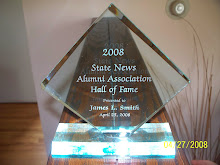Editor and Publisher has a pretty harsh criticism of the coverage of the Fort Hood shootings last week.
First the uncorrected (for hours) report that the shooter had been killed and then the complete refresh of the information crediting the woman police officer with shooting the suspect when it was actually an African-American police officer.
The E&P article hints at a possible racial reason (the woman police officer was white) for the mistake, I really think E&P has gone over the edge on this one.
Clearly, news organizations were relying on military reports in the early hours and the blame for the misinformation falls to the the military. It is highly unlikely reporters had access to the scene or any of the witnesses in those early hours so it is hard to fault the media for quoting military sources for the info.
Thursday, November 12, 2009
Subscribe to:
Post Comments (Atom)


2 comments:
Jim: I was in the Army for four years. What you said about reporters having very limited access to the things on base sounds correct. We had a sergeant major who allegedly made unwanted sexual advances towards three or four female junior enlistees (it was especially sickening since they were almost young enough to be his granddaughters). We were given very strict orders by our company commander to direct any and all public media inquiries to the base public affairs office: under no circumstances were we to talk to the local newspaper. Whistle blowing under those circumstances would've been perceived as failure to obey a direct order.
The sergeant major was then given a sweetheart deal: accept immediate retirement and the charges would be dropped.
During one deployment in the Tonkin Gulf in Vietnam a BBC television crew was put aboard our ship to film shore bombardment and some of our work thwarting efforts by the North Vietnamese to smuggle arms and agents into South Vietnam via the coastline.
We were given strict orders not to talk to the television crew and to direct them to the executive officer or the Navy "tender" a public information officer, who was assigned to them.
They asked us all questions, but we were terrified to even give them the time for fear an officer saw you and thought you were feeding them information.
Post a Comment